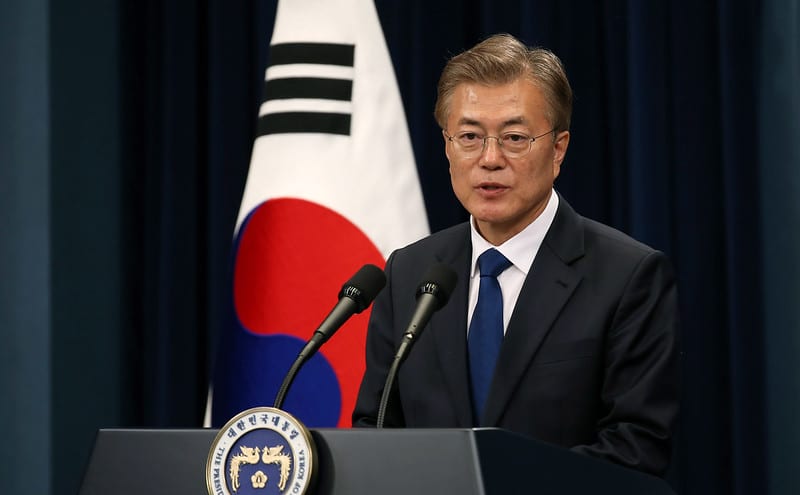The PG4 Seoul Summit took place on May 30 and 31, and aimed to unite heads of states, CEOs, investors and other stakeholders to identify and accelerate innovative sustainable solutions in developing countries. Earth.Org has put together a summary of the proceedings, day by day.
—
What is Happening?
- The theme of the PG4 Seoul Summit was “Inclusive Green Recovery Towards Carbon Neutrality.”
- Following the opening ceremony, a Leaders’ Session was held, where views were shared on inclusive green recovery, carbon neutrality by 2050 and strengthening climate action and facilitating public-private partnerships.
In his opening address, Moon Jae-in, President, Republic of Korea, said, “the vision of a green recovery that is carbon neutral invites us all to act together, and combine our knowledge and efforts.” He announced that the Republic of Korea will end financing for new overseas coal-fired power plants and will no longer issue permits for new domestic coal power plants.
- Leaders emphasised that a green recovery will require cooperation among business, government and civil society. They underscored that in building back better, the responses must focus on an inclusive, just transition that supports sustainable investment in green industries, supports growth in developing countries, and, ultimately, puts the people and the planet at the heart of achieving the Sustainable Development Goals (SDGs).
- Among the leaders, Paul Kagame, President of Rwanda, urged incentivising investment in renewable energy, while Josaia Voreqe Bainimarama, Prime Minister of Fiji, said economic recovery presents both an immense challenge and immense opportunity. He called for transition to net-zero shipping fleets, cultivation of climate-conscious industries like fishing and agriculture, and the exchange of debts for the delivery of green and blue development.
- To achieve carbon neutrality by 2050, leaders called for innovation and investment that provides both long-term environmental benefits and sustainability. They underscored the importance of partnerships and networks to fully realise the transition towards a net-zero future.
- 60 countries representing over half of all global emissions, have set net-zero carbon targets.
You might also like: New Bill Seeks to End Hong Kong’s Days as an Illegal Wildlife Trade Hub
- The final day of the P4G Seoul Summit 2021 began with five thematic breakout sessions on water, energy, agriculture, cities and the circular economy. This was followed by a Leaders’ Dialogue and a Closing Ceremony to adopt the Seoul Declaration.
- The thematic session on carbon-neutral smart water management for climate resilience discussed effective water governance in the context of carbon neutrality, and promoted partnerships and collaboration to achieve carbon-neutral water management. Participants discussed the use of innovative technologies and partnerships to reduce emissions while meeting the world’s energy needs, as well as the role of green hydrogen, public-private partnerships and enabling policy environments for achieving these goals.
- The session on a greener planet with innovative energy solutions addressed low-carbon energy solutions to contribute to carbon-neutral growth. Participants discussed innovative technologies and partnerships being used to reduce emissions.
- The resilient and sustainable agriculture and food systems session explored strengthening and developing partnerships to enhance effective cooperation in the agriculture and food sector. Participants shared experiences on efforts to support farmers, including in accessing finance; and addressed food loss and waste, particularly in the context of improving resilience and lowering emissions in the food system.
- The thematic session on partnerships for smart and resilient green cities discussed the role of smart cities for green recovery, carbon neutrality and climate crisis responses. Participants highlighted innovations for energy efficiency in transport and buildings and best practices and lessons learned.
- The session on circular economy measures towards a zero-waste society addressed the latest global efforts, actions and innovations in the circular economy, with a special focus on zero waste. Participants highlighted the importance of circular business models, recycling, sustainable fashion and manufacturing.
- The Leaders’ Dialogue featured heads of state and leaders sharing their national experiences for achieving inclusive green recovery. Among many, Franciso Sagasti Hochhausler, President of Peru, called for the intellectual property regime to be reviewed with regard to health and energy.
- The Leaders adopted the Seoul Declaration without amendment. The Declaration underscores inclusive green recovery, the importance of PPPs and the role of youth.
Summits like the PG4 Seoul Summit are vital in encouraging and fostering international cooperation. In the age of advancing climate change, this cooperation is becoming increasingly important if we have a chance of achieving climate goals.
Featured image by: Flickr

















